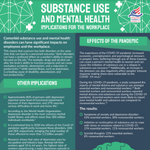New Resource: Substance Use and Mental Health

On the occasion of Drug Free Work Week, Drug Free America Foundation updated and re-released its workplace resource on substance use and mental health.
Comorbid substance use and mental health disorders can have significant impacts on employees and the workplace. This means that a person has both disorders at the same time that can lead to a worsened outcome. Both disorders can have a profound effect on a worker’s ability to remain focused on the job. For example, drugs and alcohol can alter the brain’s ability to function properly and can cause workplace accidents, absenteeism, and a reduction in productivity, while mental illness, such as depression, is a leading cause of disability, absenteeism, and lost productivity. Other implications for the workplace include:
Other Implications
• Approximately 80% of persons with depression reported some level of functional impairment because of their depression, and 27% reported serious difficulties in work and home life.
• According to the World Health Organization, depressive disorder is the most common mental health illness, and affects more than 300 million individuals worldwide.
• It is estimated that in 2020 the effects of the Covid-19 pandemic significantly increased these disorders, 26% and 28% respectively, bringing the total number of those affected to more than 1.2 billion people.
• Research shows that rates of depression vary by occupation and industry type. Among full-time workers aged 18 to 64 years, the highest rates of workers experiencing a major depressive episode in the past year were found in the personal care and service occupations (10.8%) and the food preparation and serving related occupations (10.3%).
The ability to identify mental health or substance use disorders in the workplace is complicated due to employee concerns about confidentiality, stigma, and fear of employment repercussions. However, many times the employee’s adverse behavior related to substance use or mental illness can lead to employment counseling or other employment action that provides them with opportunity and encouragement to seek help.